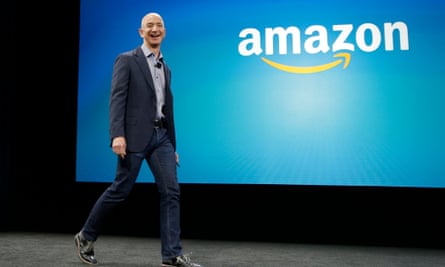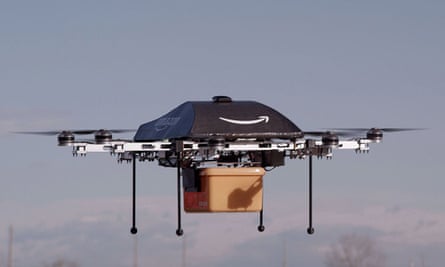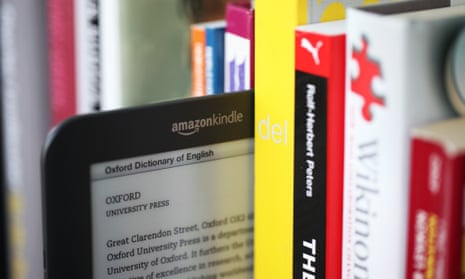It was originally billed as “Earth’s Biggest Bookstore” and featured over one million titles. Twenty years later it boasts over 270m active accounts and claims to have more than 2m third-party vendors selling millions of products through the marketplace platform. In that time it has been both lauded and vilified, most recently over corporation tax and staff working conditions but Amazon is quite clearly one of the biggest success stories of online commerce. So what has been its lasting impact? Can it maintain this growth or have we seen the best of it?
Amazon was born in July 1994, with the online site launching as Amazon.com a year later. In 1995, Bill Gates, founder and CEO at Microsoft, reportedly paid The Rolling Stones $3m (£1.9m) for the rights to use Start Me Up to launch Windows 95. It was also the year eBay launched as AuctionWeb (a bit later in September) and there were, according to IDC, 16m global internet users compared with over three billion today.
“The present, as we know it, began to take shape during those 12 consequential months,” said W. Joseph Campbell in his book, 1995: The Year the Future Began. How very true and the internet and Amazon in particular has played a massive role.
“It was retail’s punk rock moment,” says Patrick O’Brien, content director at retail analyst Verdict, recalling Amazon’s arrival in the UK in 1998.
“Before Amazon, UK retailers were quite complacent with not a lot of focus on customer service. Customers were taken for granted. Amazon really did shake things up and show retailers what could be achieved online.”
In 1999, Time Magazine declared founder Jeff Bezos the “king of cybercommerce” as it made the then 35-year-old its Person of the Year. It was an entrée to the changing attitudes of the impending dotcom boom. Amazon had made losses of over $390m that year and yet its stock price put a valuation on the business of just less than $12bn. This was the new disruptive economy.

A revolution in self-publishing
Clare Rayner, retail expert and founder of www.independentretail.co.uk and www.futurehighstreet.co.uk has watched Amazon closely over the years. While its impact on retail is unquestionable, from user reviews of products through to its persistence in developing a slick, global department store, Rayner points out that there has also been plenty of pain for Amazon’s gain.
“Amazon has focused on undercutting recommended retail prices and has even provided price comparison apps that led to showrooming,” says Rayner. “This is further exacerbated by the preferential terms it agrees with suppliers. It has been said that Amazon is responsible for the rapid decline in the number of physical retailers selling books, DVDs, music and games.”
While Amazon certainly disrupted the traditional book market, it has been the Kindle which has really ripped up the model. The first Kindle, launched in 2007, kickstarted a revolution in self-publishing and has contributed to the decline of traditional book sales. In 2014, the number of independent bookshops in the UK fell below 1,000 for the first time.
In 2006, Amazon also launched its Amazon web services (AWS). Synergy Research Group in the US puts Amazon’s 2014 share of this cloud computing infrastructure market at a dominant 28% . It’s certainly an unsung hero of the modern cloud-driven internet and will no doubt have greater influence as startups cultured on its services grow and establish themselves.
Other products have been less successful. The Fire smartphone, according to O’Brien has so far been “a disaster” while Amazon has not yet taken full advantage of its 2011 takeover of LoveFilm, a business that helped to disrupt the UK video rental market.
Overstretched or hyperactive?
So has Amazon overstretched itself or is this just the pattern of a hyperactive business, one that can’t sit still and wants to play with everything in reach?
“Amazon is prepared to try things and invests so much back into research and development,” says O’Brien. “It’s not afraid to have a go – just look at the Dash button and what it’s trying to do with drones.”
It’s a good point. It’s this energy to constantly innovate and experiment that has caught the eye so often over the last 20 years. For example, when Amazon first announced experiments with drone deliveries in 2013 there was an assumption it was nothing but a PR stunt. Now it seems almost inevitable.
“Amazon has raised the bar,” says Rayner, “which has forced other retailers, the likes of John Lewis and Marks and Spencer to also improve and look for competitive advantage through value-adding services like Click & Collect.”
Dr Phil Streatfield, partner at supply chain and logistics consultancy LCP Consulting agrees with the sentiment but is wary. He believes Amazon and its delivery policies have also had a negative impact, particularly on supply chains. He says Amazon has “raised customer expectations” beyond a sustainable level and its plans for one hour deliveries in cities such as London “has massive implications for the supply chain.”

Disruption
Is this Amazon’s biggest impact, its disruption?
Andy Mulcahy editor, at UK online retail association IMRG believes it is more positive than that, pointing to its importing of what has been a US retail institution since the early 00s – Black Friday.
The shopping day after Thanksgiving is certainly enjoyed by many UK retailers now. Mulcahy says the scale of it last year “took all by surprise” with UK retail sites receiving 181m visits with the estimated online spend reaching £810m. “The biggest ever day for UK online sales,” he adds.
Amazon itself took 5.5m orders that day, breaking its previous records, but O’Brien recently pointed out that in fact its growth is slowing, in the UK at least, to 8.6%. And it’s starting to pay corporation tax too, according to reports.
So what will the next 20 years look like? The jury is out. Can it evolve into a global media company? Will it buy a chain of bricks and mortar stores? Will it rival Google for search or develop robotic and automated shopping? Peter Fader, Wharton marketing professor and co-director of the Wharton Customer Analytics Initiative believes it is simpler than that: “Customers just love what Amazon means to them even if publishers and other intermediaries don’t. I think they are going to expand their footprint and their tentacles into us even deeper.”
To get weekly news analysis, job alerts and event notifications direct to your inbox, sign up free for Media and Tech Network membership.
All Guardian Media and Tech Network content is editorially independent except for pieces labelled “Brought to you by” – find out more here.

Comments (…)
Sign in or create your Guardian account to join the discussion